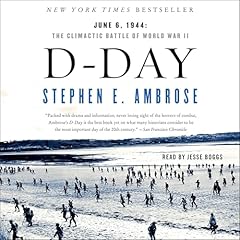
The Fleet at Flood Tide
America at Total War in the Pacific, 1944-1945
No se pudo agregar al carrito
Solo puedes tener X títulos en el carrito para realizar el pago.
Add to Cart failed.
Por favor prueba de nuevo más tarde
Error al Agregar a Lista de Deseos.
Por favor prueba de nuevo más tarde
Error al eliminar de la lista de deseos.
Por favor prueba de nuevo más tarde
Error al añadir a tu biblioteca
Por favor intenta de nuevo
Error al seguir el podcast
Intenta nuevamente
Error al dejar de seguir el podcast
Intenta nuevamente
 Exclusivo para miembros Prime: ¿Nuevo en Audible? Obtén 2 audiolibros gratis con tu prueba.
Exclusivo para miembros Prime: ¿Nuevo en Audible? Obtén 2 audiolibros gratis con tu prueba.
Elige 1 audiolibro al mes de nuestra inigualable colección.
Acceso ilimitado a nuestro catálogo de más de 150,000 audiolibros y podcasts.
Accede a ofertas y descuentos exclusivos.
Premium Plus se renueva automáticamente por $14.95 al mes después de 30 días. Cancela en cualquier momento.
Compra ahora por $27.00
-
Narrado por:
-
Pete Larkin
“A masterful, fresh account of the latter days of the war in the Pacific . . . Hornfischer offers perspective on world conflict and cautions for humanity that can be pondered far beyond the conclusion of World War II.”—The Dallas Morning News
WINNER: Commodore John Barry Book Aard, Navy League of the United States; John Lehman Distinguished Naval Historian Award, Naval Order of the United States
With its thunderous assault on the Mariana Islands in June 1944, the United States crossed the threshold of total war. In this tour de force of dramatic storytelling, distilled from extensive research in newly discovered primary sources, James D. Hornfischer brings to life the campaign that was the fulcrum of the drive to compel Tokyo to surrender—and that forever changed the art of modern war.
With a close focus on high commanders, front-line combatants, and ordinary people, American and Japanese alike, Hornfischer tells the story of the climactic end of the Pacific War as has never been done before. Here are the epic seaborne invasions of Saipan, Tinian, and Guam, the stunning aerial battles of the Great Marianas Turkey Shoot, the first large-scale use of Navy underwater demolition teams, the largest banzai attack of the war, and the daring combat operations large and small that made possible the strategic bombing offensive culminating in the atomic strikes on Hiroshima and Nagasaki.
From the seas of the Central Pacific to the shores of Japan itself, The Fleet at Flood Tide is a stirring, authoritative, and cinematic portrayal of World War II’s world-changing finale.
Los oyentes también disfrutaron:




















Las personas que vieron esto también vieron:


















What did you love best about The Fleet at Flood Tide?
Getting a lot of the details from both USN and IJN about the final year of the war. I was disappointed that so little time was spent on the Battle of Samar, 25 Oct. The author has written a whole book about this and it is excellent.Any additional comments?
Very good for those interested in WWII naval history that already know the overall picture.Good at filling in all those other details
Se ha producido un error. Vuelve a intentarlo dentro de unos minutos.
great audio book. captivating and informative
Se ha producido un error. Vuelve a intentarlo dentro de unos minutos.
One of my new favorite WW2 audio books
Se ha producido un error. Vuelve a intentarlo dentro de unos minutos.
WW2
Se ha producido un error. Vuelve a intentarlo dentro de unos minutos.
different but very good
Se ha producido un error. Vuelve a intentarlo dentro de unos minutos.


